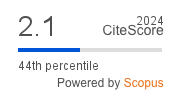Enhancing User Query Comprehension and Contextual Relevance with a Semantic Search Engine using BERT and ElasticSearch
DOI:
https://doi.org/10.4108/eetiot.6993Keywords:
Semantic Search Engine, Elastic Search, BERT Model (SBERT)Abstract
This research paper explores the development of a semantic search engine designed to enhance user query comprehension and deliver contextually applicable research results. Classic search engines basically struggle to catch the nuanced meaning of user queries, giving to suboptimal results. To address this challenge, we give the merge of advanced natural language processing (NLP) techniques with Elasticsearch, and with a specific focus on Bidirectional Encoder Representations from Transformers (BERT), a state-of-the-art pre-trained language model. Our approach involves leveraging BERT's ability to analyze the contextual meaning of words within documents by sentence transformers as (SBERT) , enabling the search engine to grab the user queries and better under- stand semantics of the content as it is converted into vector embeddings making it understandable in the Elasticsearch server. By utilizing BERT's bidirectional attention mechanism, the search engine can discern the relationships between words, thereby capturing the contextual nuances that are crucial for accurate query interpretation. Through experimental validation and performance assessments, we demonstrate the efficacy of our semantic search engine in providing contextually relevant search results. This research contributes to the advancement of search technology by enhancing the intelligence of search engines, ultimately improving the user experience by giving context based research.
Downloads
References
[1] Kamath S, Sowmya & Kanakaraj, Monisha. (2014). NLP based Intelligent News Search Engine using Information Extraction from E-Newspapers. 10.1109/ICCIC.2014.7238500.
[2] Mukhopadhyay, Debajyoti & Sharma, Manoj & Joshi, Gajanan & Pagare, Trupti & Palwe, Adarsha. (2013). Intelligent Agent Based Semantic Web in Cloud Computing Environment.
[3] Achsas, Sanae & Nfaoui, El Habib. (2022). Academic Aggregated Search Approach Based on BERT Language Model. 1-9. 10.1109/IRASET52964.2022.9737888.
[4] Patel, Manish. (2019). TinySearch -- Semantics based Search Engine using Bert Embed- dings.
[5] Rashid, Junaid & Nisar, Muhammad. (2016). A Study on Semantic Searching, Semantic Search Engines and Technologies Used for Semantic Search Engines. International Journal of Information Technology and Computer Science(IJITCS)International Journal of Infor- mation Technology and Computer Science(IJITCS). 10. 82-89. 10.5815/ijitcs.2016.10.10.
[6] Sadeeq, Mohammed & Zeebaree, Subhi. (2021). Semantic Search Engine Optimisation (SSEO) for Dynamic Websites: A Review. 5. 148-158. 10.5281/zenodo.4536804.
[7] Laddha, Shilpa & Jawandhiya, Pradip. (2017). Semantic Search Engine. Indian Journal of Science and Technology. 10. 1-6. 10.17485/ijst/2017/v10i23/115568.
[8] Mukhopadhyay, Debajyoti & Sharma, Manoj & Joshi, Gajanan & Pagare, Trupti & Palwe, Adarsha. (2013). Experience of Developing a Meta-Semantic Search Engine. 10.1109/CUBE.2013.38.
[9] Munarko, Yuda & Rampadarath, Anand & Nickerson, David. (2023). Building a search tool for compositely annotated entities using Transformer-based approach: Case study in Biosimulation Model Search Engine (BMSE). F1000Research. 12. 162. 10.12688/f1000re- search.128982.1.
[10] Sulistiyo, Edy & Wibawa, Setya chendra & Sujatmiko, Bambang & Nugroho, Dimas. (2021). The making of Android-based search engine applications with Elastic-search algorithm to improve programming competence. IOP Conference Series: Materials Science and Engineering. 1098. 042089. 10.1088/1757-899X/1098/4/042089.
[11] Malekar, Mrunal. (2021). Deep Learning-Based Question Answering Search Engine. In- ternational Journal of Scientific Research in Computer Science, Engineering and Information Technology. 25-32. 10.32628/CSEIT2172139.
Downloads
Published
Issue
Section
License
Copyright (c) 2024 EAI Endorsed Transactions on Internet of Things

This work is licensed under a Creative Commons Attribution 3.0 Unported License.
This is an open-access article distributed under the terms of the Creative Commons Attribution CC BY 4.0 license, which permits unlimited use, distribution, and reproduction in any medium so long as the original work is properly cited.




